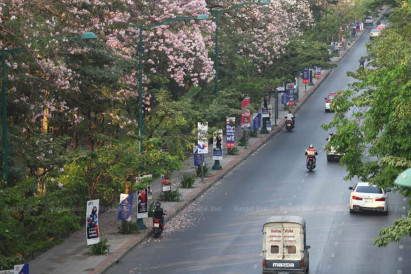Pheu Thai’s digital cash plan takes flak

The government has warned against political parties’ populist policies requiring substantial sums of money, saying that after other essential expenses are deducted, the budget for the 2024 fiscal year will have only 220 billion baht left for spending on such policies.
The warning came after Prime Minister Prayut Chan-o-cha called in officials from four agencies dealing with economic affairs to provide him with updates on the global and domestic economic situations as well as the country’s financial standing at Tuesday’s cabinet meeting.
Gen Prayut is the United Thai Nation (UTN) Party’s prime ministerial candidate.
The four agencies are the National Economic and Social Development Council, the Fiscal Policy Office, the Budget Bureau, and the Bank of Thailand.
Cabinet ministers were also allowed to ask them whether campaign policies proposed by political parties would have any impact on the country’s financial standing and whether there would be sufficient funding for those policy pledges.
On Jan 10, the cabinet approved a budget of 3.35 trillion baht (US$100 billion) for the 2024 fiscal year starting on Oct 1.
The 3.35-trillion-baht budget comprises 2.508 trillion baht worth of fixed expenditure. The amount makes up 74% of the overall budget.
The budget also includes funds for replenishing the national coffers to the tune of 33.7 billion baht, which accounts for 1.01% of the entire budget.
In addition, 117.25 billion baht is earmarked for repaying the principal of government loans, up 17.25% from last year’s budget.
Speaking after the meeting, government spokesman Anucha Burapachaisri said that officials from the Budget Bureau briefed the cabinet on the framework of the fiscal 2024 budget.
After other expenses were deducted from the budget, there will be 220 billion baht left, which may not be sufficient to finance any campaign policies touted by political parties before the May 14 general election, he said.
“The Budget Bureau informed the cabinet that it will be difficult to reallocate budget funds to implement new projects [touted by parties],” he said.
Deputy Prime Minister Wissanu Krea-ngam said after the cabinet meeting that there would be about 200 billion baht left over for spending on new projects after other expenses have been deducted.
If any extra money is required to finance those projects, additional taxes must be collected, or other sources of funding must be found, he said.
“When the new government takes office, it will likely revise the budget amount and find ways to handle the more than 200 billion baht,” Mr Wissanu said.
Mr Anucha further said the Bank of Thailand told the meeting that Thailand has no financial stability risks while the level of foreign debt is not too high. The cash balance held in state coffers is at the proper level, and the country’s financial institutions remain strong.
“The government’s borrowing of 1.5 trillion baht to take care of people’s health during Covid-19 was also an appropriate policy,” he said, citing the Bank of Thailand.
However, from now on, future government policies should focus mainly on helping vulnerable groups in society rather than stimulating the economy, Mr Anucha said.
“In conclusion, the four economic agencies agreed that the implementation of the existing policies has contributed to the country’s financial stability and is suited for the current situation,” he said.
Thanakorn Wangboonkongchana, the Prime Minister’s Office Minister, who is also a key figure of the UTN, on Tuesday took aim at the Pheu Thai Party’s policy of giving 10,000-baht in digital money to everyone aged 16 and older.
He said the policy is too extreme as it could pose a risk to the country’s financial status if there was insufficient funding for it.

